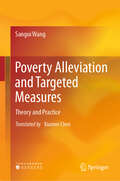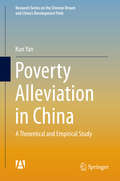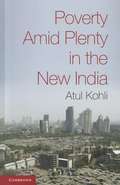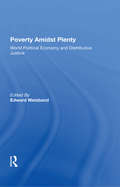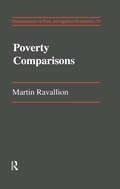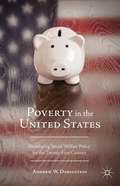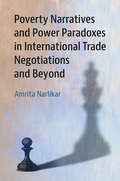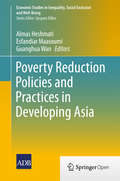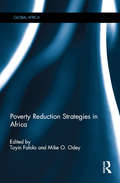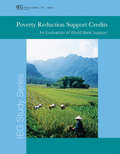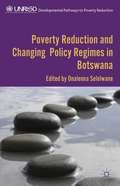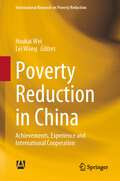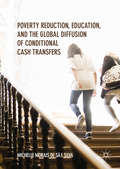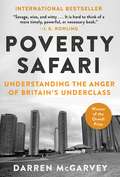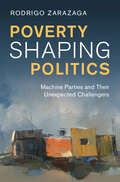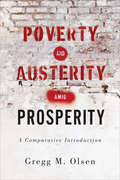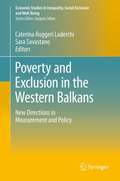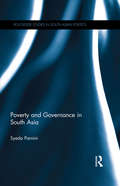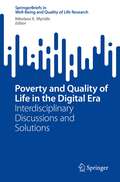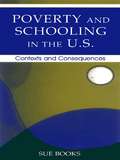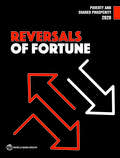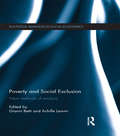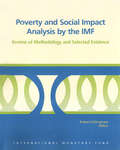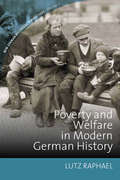- Table View
- List View
Poverty Alleviation and Targeted Measures: Theory and Practice
by Sangui WangThis book examines China’s remarkable success in reducing poverty the largest and most significant effort of poverty alleviation in human history. It begins by outlining the background of poverty alleviation in China, systematically analyzing its organizational and policy frameworks, and detailing the implementation models and pathways of targeted poverty alleviation. Next, it addresses the challenges and practices associated with poverty alleviation in China, summarizing the experiences that illustrate not only significant achievements in poverty reduction but also far-reaching political, social, and international implications. Finally, at a pivotal moment in the CPC’s pursuit of its second centenary goal, the book connects poverty alleviation with rural revitalization, which is essential for the next phase of agricultural and rural development in China. It offers a forward-looking analysis of relative poverty alleviation and proposes specific strategies to address these challenges.
Poverty Alleviation in China
by Kun YanThis study systematically investigates the development process, major characteristics and weak links of China's poverty alleviation experience and conducts a comparative analysis of poverty alleviation cases. It also accurately presents the internal logic and core elements of China's poverty alleviation theory and taking the Chinese experience of poverty alleviation refines the "Two Threads One Force" theoretical framework to make a basic judgment of the "China model" for poverty alleviation. It also presents the rationale and plans for responding to new challenges to achieve poverty alleviation goals, which will enhance the welfare of the people and promote social progress and national prosperity.
Poverty Amid Plenty in the New India
by Atul KohliIndia has one of the fastest growing economies on earth. Over the past three decades, socialism has been replaced by pro-business policies as the way forward. And yet, in this 'new' India, grinding poverty is still a feature of everyday life. Some 450 million people subsist on less than $1.25 per day and nearly half of India's children are malnourished. In his latest book, Atul Kohli, a seasoned scholar of Indian politics and economics, blames this discrepancy on the narrow nature of the ruling alliance in India that, in its new-found relationship with business, has prioritized economic growth above all other social and political considerations. This thoughtful and challenging book affords an alternative vision of India's rise in the world that its democratic rulers will be forced to come to grips with in the years ahead.
Poverty Amidst Plenty: World Political Economy And Distributive Justice
by Edward WeisbandEdward Weisband's pioneering text is destined to transform the current teaching of world political economy at both the introductory and the advanced level. Outlining the moral principles and ethical concepts fundamental to grasping the human significance of poverty, he clearly reveals what is often hinted at but rarely stated–that the political dimensions of poverty and distributive justice constitute the organizing framework of the study of world political economy. Against a backdrop of readings, Professor Weisband's insightful, interpretative essays generate an interdisciplinary discussion, a synthesis of theoretical perspectives and value orientations, providing students with a critical comprehension of the complex workings of the world economy. The essays link basic approaches to world politics and international relations, international law and organization, international sociology, development studies, and moral philosophy to give texture to such basic theories as modes of production, dependency, world systems, unequal exchange, the labor theory of value, free-trade liberalism, neomercantilism, Marxism, and neo-Marxism. Alternative value orientations are also explored, including realist and neo-realist, conservative and liberal, egalitarian and cosmopolitan, radical and materialist. Poverty Amidst Plenty combines theory and analysis with historical and normative perspectives to offer students a relevant, prescriptive, and most of all, human picture of the far-reaching system that governs much of our lives.
Poverty Comparisons: A Guide To Concepts And Methods (Living Standards Measurement Study Working Papers #No. 88)
by Martin RavallionFirst published in 1994. Routledge is an imprint of Taylor & Francis, an informa company.
Poverty In The United States
by Andrew W. DobelsteinThis book attributes American poverty to consequences 19th Century social welfare policies within an economy stretching to meet its 21st Century economic potential, arguing that American poverty persists as economic and political structures have moved into the world of fiscal planning but social welfare remains in its Depression-era structure.
Poverty Knowledge in South Africa
by Grace DaviePoverty is South Africa's greatest challenge. But what is "poverty"? And how can it be measured and addressed? In South Africa, human-science knowledge about the cost of living grew out of colonialism, industrialization, apartheid, and civil resistance campaigns, which makes this knowledge far from neutral or apolitical. South Africans have used the Poverty Datum Line (PDL), and other poverty indicators, to petition the state, to chip away at the pillars of white supremacy, and, more recently, to criticize the postapartheid government's failures to deliver on its promises. Rather than advocating one particular policy solution, this book argues that poverty knowledge - including knowledge of the tension between quantitative and qualitative observations - teaches us about the dynamics of historical change, the power of racial thinking in white settler societies, and the role of ordinary people in shaping state policy. Readers will gain new perspectives on today's debates about social welfare, redistribution, and human rights and will ultimately find reasons to rethink conventional approaches to advocacy.
Poverty Narratives and Power Paradoxes in International Trade Negotiations and Beyond
by Amrita NarlikarIn this work, Amrita Narlikar argues that, contrary to common assumption, modern-day politics displays a surprising paradox: poverty - and the powerlessness with which it is associated - has emerged as a political tool and a formidable weapon in international negotiation. The success of poverty narratives, however, means that their use has not been limited to the neediest. Focusing on behaviours and outcomes in a particularly polarising area of bargaining - international trade - and illustrating wider applications of the argument, Narlikar shows how these narratives have been effectively used. Yet, she also sheds light on how indiscriminate overuse and misuse increasingly run the risk of adverse consequences for the system at large, and devastating repercussions for the weakest members of society. Narlikar advances a theory of agency and empowerment by focusing on the life-cycles of narratives, and concludes by offering policy-relevant insights on how to construct winning and sustainable narratives.
Poverty Reduction Policies and Practices in Developing Asia
by Almas Heshmati Esfandiar Maasoumi Guanghua WanThis book looks at the major policy challenges facing developing Asia and how the region sustains rapid economic growth to reduce multidimensional poverty through socially inclusive and environmentally sustainable measures. Asia is facing many challenges arising from population growth, rapid urbanization, provision of services, climate change and the need to redress declining growth after the global financial crisis. This book examines poverty and related issues and aims to advance the development of new tools and measurement of multidimensional poverty and poverty reduction policy analysis. The book covers a wide range of issues, including determinants and causes of poverty and its changes; consequences and impacts of poverty on human capital formation, growth and consumption; assessment of poverty strategies and policies; the role of government, NGOs and other institutions in poverty reduction; rural-urban migration and poverty; vulnerability to poverty; breakdown of poverty into chronic and transitory components; and a comparative study on poverty issues in Asia and other regions. The book will appeal to all those interested in economic development, resources, policies and economic welfare and growth.
Poverty Reduction Strategies in Africa: The Ideology Of The Family-state (Global Africa)
by Toyin Falola and Mike O. OdeyA fundamental question about contemporary Africa is why does Africa remain so poor, long after the departure of the European Colonial domination and in the midst of so many natural resources? Poverty Reduction Strategies in Africa provides new understandings of the persistent issue of poverty in Sub-Saharan Africa and makes recommendations for policy frameworks to help African governments alleviate poverty. Each chapters uses case studies to review the old strategies for resolving the problem of poverty in the continent and make the case for new initiatives to address poverty. The contributors focus on practical and day-to-day issues as the best approach to formulate and implement poverty reduction strategies in contemporary Africa. This book is invaluable reading for students and scholars of African politics and development.
Poverty Reduction Support Credits: An Evaluation of World Bank Support
by World BankThis evaluation examines the relevance and effectiveness of Poverty Reduction Support Credits (PRSCs), introduced by the Bank in early 2001 to support comprehensive growth, improve social conditions, and reduce poverty in IDA countries. PRSCs were intended to allow greater country-ownership, provide more predictable annual support, exhibit more flexible conditionality, and strengthen budget processes in a results-based framework. By September 2009, the Bank had approved 99 PRSCs totaling some $7.5 billion and representing 38% percent of IDA policy based lending. The evaluation finds that in terms of process, PRSCs were effective in easing conditionality, increasing country ownership and aid predictability, stimulating dialogue between central and sectoral ministries, and improving donor harmonization. In terms of content, PRSCs succeeded in emphasizing public sector management and pro-poor service delivery. Yet in terms of results, it is difficult to distinguish growth and poverty outcomes in countries with PRSCs from other better performing IDA countries. There is scope for further simplifying the language of conditionality and underpinning PRSCs with better pro-poor growth diagnostics. PRSCs can also strengthen their results frameworks and limit sector policy content in multi-sector DPLs to high-level or cross-cutting issues. Today, Bank policy has subsumed PRSCs under the broader mantle of Development Policy Lending and the rationale for a separate 'brand name' although differences linger from the past. Since PRSCs and other policy-based lending have gradually converged in design, remaining differences compared to other Development Policy Loans should be clearly spelled out, or the separate PRSC brand name should be phased out.
Poverty Reduction and Changing Policy Regimes in Botswana (Developmental Pathways to Poverty Reduction)
by Onalenna SelolwaneAn examination of how Botswana overcame the legacies of exceptional resource deficiency and colonial neglect, to transform itself from one of the poorest nations of the world to a middle income economy. Contributions review how economic, social and institutional policies interacted to produce successful poverty reduction.
Poverty Reduction in China: Achievements, Experience and International Cooperation (International Research on Poverty Reduction)
by Lei Wang Houkai WeiThis book provides a systematic overview of China's achievements in eliminating absolute poverty by 2020 under current standards. The book is divided into three parts: The first part is a study of major policy practices with distinctive characteristics in China's poverty alleviation practices; the second part is a study of China's international cooperation in poverty alleviation; the third part is a study of China's poverty alleviation by international scholars from the perspective of international cooperation and international comparison. These reports pay attention to China's achievements and experiences in poverty alleviation and reflect on how to strengthen cooperation with China in poverty alleviation.
Poverty Reduction, Education, and the Global Diffusion of Conditional Cash Transfers
by Michelle Morais de Sá e SilvaThis book explores Conditional Cash Transfers programs within the context of education policy over the past several decades. Conditional Cash Transfer programs (CCTs) provide cash to poor families upon the fulfillment of conditions related to the education and health of their children. Even though CCTs aim to improve educational attainment, it is not clear whether Departments or Ministries of Education have internalized CCTs into their own sets of policies and whether that has had an impact on the quality of education being offered to low income students. Equally intriguing is the question of how conditional cash transfer programs have been politically sustained in so many countries, some of them having existed for over ten years. In order to explore that, this book will build upon a comparative study of three programs across the Americas: Opportunity NYC, Subsidios Condicionados a la Asistencia Escolar (Bogota, Colombia), and Bolsa Famila (Brazil). The book presents a detailed and non-official account on the NYC and Bogota programs and will analyze CCTs from both a political and education policy perspective.
Poverty Safari: Understanding the Anger of Britain's Underclass
by Darren McGarvey&“Savage, wise, and witty . . . It is hard to think of a more timely, powerful, or necessary book.&”--J. K. RowlingInternational Bestseller! For readers of Hillbilly Elegy and Evicted, the Orwell Prize–winner that helps us all understand Brexit, Donald Trump, and the connection between poverty and the rise of tribalism in the United Kingdom, in the US, and around the world. Darren McGarvey has experienced poverty and its devastations firsthand. He grew up in a community where violence was a form of currency and has lived through addiction, abuse, and homelessness. He knows why people from deprived communities feel angry and unheard. And he wants to explain . . .So he invites you to come along on a safari of sorts. But not the kind where the wildlife is surveyed from a safe distance. His vivid, visceral, and cogently argued book—part memoir and part polemic—takes us inside the experience of extreme poverty and its stresses to show how the pressures really feel and how hard their legacy is to overcome.Arguing that both the political left and right misunderstand poverty as it is actually lived, McGarvey sets forth what everybody—including himself—could do to change things. Razor-sharp, fearless, and brutally honest, Poverty Safari offers unforgettable insight into conditions in modern Britain, including what led to Brexit—and, beyond that, into issues of inequality, tribalism, cultural anxiety, identity politics, the poverty industry, and the resentment, anger, and feelings of exclusion and being left behind that have fueled right-wing populism and the rise of ethno-nationalism.
Poverty Shaping Politics: Machine Parties and Their Unexpected Challengers
by Rodrigo ZarazagaDrawing on substantial original interviews and fieldwork data from Argentina's marginalized urban areas, Poverty Shaping Politics reveals how the spatial segregation of slums and vulnerable neighborhoods compels the poor to seek out local political brokers to access resources, while politicians depend on these brokers to navigate poor areas and garner political support. Rodrigo Zarazaga uniquely demonstrates that the establishment of broker networks is driven more by the conditions of segregated poverty and vulnerability than by the inherent capabilities of 'machine-like' parties. Using the case of Cambiemos challenging Peronism in poor districts, Zarazaga provides the first account of a party building broker networks to contest a dominant machine party. While existing literature suggests that sustained economic development can weaken machine parties, this book shows that entrenched and widespread poverty can also threaten their hegemony.
Poverty and Austerity amid Prosperity: A Comparative Introduction
by Gregg M. OlsenPoverty and Austerity amid Prosperity puts a sharp focus on rising levels of poverty and homelessness in Canada, the United Kingdom, and the United States. Highlighting the important differences between these countries, Gregg M. Olsen examines how poverty and homelessness have been conceptualized, defined, measured, and addressed in each country. Olsen critically contrasts the two main theoretical traditions – individual and societal – that have emerged to explain poverty and homelessness. Ultimately, he argues that societal approaches to the study of poverty are better equipped to explain the developments unfolding across these nations and that the eradication of poverty will only happen when the socioeconomic system has been seriously overhauled and founded upon economic democracy.
Poverty and Exclusion in the Western Balkans
by Caterina Ruggeri Laderchi Sara SavastanoThis book maps the latest developments in the policy relevant analysis on poverty, inclusion and the social agenda in the Western Balkans. It does so by presenting a selection of recent papers which explore from a methodological and analytical point of view how the inclusion agenda can be monitored and adapted to understand the challenges in the region. The volume includes an overview and four sections, covering respectively: (1) innovations in terms of measurement of poverty and inclusion in the region (the concept of inclusion as elaborated at the EU level, innovations in survey design to suit the measurement of inclusion, methodological insights from qualitative work); (2) innovative country level analysis (updating poverty mapping in inter-censual years, the analysis of material deprivation, the analysis of determinants of social inclusion, subjective wellbeing of public work programs participants); (3) examples of country level analysis of drivers of exclusion (barriers to formalization in the labour market, gender disparities in the labour market, disruption in social networks following urbanizations, attitudes towards multi-ethnic states); (4) building inclusive safety nets (an assessment of safety nets in the region, the political economy of welfare reform, micro-simulations of social assistance reform, the adoption of better tools to improve targeting performance). The chapters combine sophisticated techniques which are at the frontiers of poverty analysis (small area estimation, efficiency analysis applied to household welfare, micro-simulations) with less ground-breaking papers which take advantage of innovative datasets or perspectives deeply grounded in the policy dialogue in the countries of the region. By providing a wide spectrum of innovative and policy relevant analytical contributions this book will be of broader interest than for observers of the region.
Poverty and Governance in South Asia (Routledge Studies in South Asian Politics)
by Syeda Naushin ParniniAcross South Asia in the last two decades, there has been widespread emphasis on governance reforms aiming to reduce poverty through Millennium Development Goals (MDGs). The recent development agenda has had great impact over the region , and this book finds that it largely widens the gap between the rich and poor, which combined with rising inflation, contributes to political instability. The book analyses the discourses of development agenda and governance crisis and provides a survey of the region by not only focusing on India, Pakistan and Bangladesh but also on the smaller countries in the region, such as Bhutan. Explaining three components of the development agenda as criteria for economic development – poverty reduction, governance reforms and civil society participation through liberal democracy – this book explores the consequences of the neo-liberal democracy and recent development agenda coupled with governance reforms. This work argues that the political economy of South Asia is largely derived from experiences of historical colonialism and recent changes driven by contemporary rise of India as a global power after the triumph of new-liberal democracy and market capitalism in the post-cold war era. It proposes a strengthening of the instruments of endogenous governance and people's participation in South Asian countries to reduce poverty through MDGs and other development goals in combination with top-down and bottom up approaches. Offering an understanding of governance and development in the context of the South Asia, this book will be of interest to academics in the fields of Political Economics, International Development Studies, Political Science, and Governance Studies, as well as policy makers.
Poverty and Quality of Life in the Digital Era: Interdisciplinary Discussions and Solutions (SpringerBriefs in Well-Being and Quality of Life Research)
by Nikolaos E. MyridisThis book proposes new solutions to the problem of poverty, and begins with providing analyses. It bases most of the analyses and solutions in the context of the digital era. The book also follows, in addition to a scientific distribution, a spatial-geographical one: analyses of countries of the European Union as well as South Africa, while it referring to two main variables, television and art, as agents of poverty alleviation. The book places particular focus on how poverty is understood in the framework of Industry 4.0. It introduces a new expanded Multidimensional Poverty Index with more than 20 dimensions; moreover, it provides a mathematically based solution for the disposal of perishable food. Finally, it does not disregard the crucial aspect of the issue of poverty: that of education planning. This book is of interest to specialists in poverty research, from students to professionals and from professors to activists, without excluding engineers.
Poverty and Schooling in the U.S.: Contexts and Consequences (Sociocultural, Political, and Historical Studies in Education)
by Sue BooksPoverty is an educational issue because it affects children's physical, emotional, and cognitive development. Especially in current times, taken-for-granted ideas about poverty and poor children must be scrutinized and reconsidered. That is the goal of this book. Poverty and Schooling in the U.S.: Contexts and Consequences is in part a plea for educators and future educators to undertake the intellectual and emotional work of learning more about the social causes, as well as the sometimes life-altering consequences of poverty. Although such efforts will not eradicate poverty, they can help form more insightful educators, administrators, policymakers, and researchers. The book is also an effort to bring to the table a larger conversation about the educational significance of the social and legal policy contexts of poverty and about typical school experiences of poor children. Poverty and Schooling in the U.S.: Contexts and Consequences: *describes what teachers need to know or to understand about the contexts and consequences of poverty; *provides information and analysis of the social context of poverty; *examines the experience of many children and families living in poverty; *documents the demographics of poverty and offers a critique of the official U.S. poverty metric; *reports on continuing and significant disparities in school funding; *presents historical context through a broad-brush review of some of the landmark legal decisions in the struggle for educational opportunity; *looks at some typical school experiences of poor children; *considers the consequences of the federal No Child Left Behind Act; and *offers suggestions about the kind of educational reform that could make a difference in the lives of poor children.This book is fundamental for faculty, researchers, school practitioners, and students across the field of education. It is accessible to all readers. An extensive background in social theory, educational theory, or statistics is not required.
Poverty and Shared Prosperity 2020: Reversals of Fortune (Poverty and Shared Prosperity)
by World BankThis edition of the biennial Poverty and Shared Prosperity report brings sobering news. The COVID-19 (coronavirus) pandemic and its associated economic crisis, compounded by the effects of armed conflict and climate change, are reversing hard-won gains in poverty reduction and shared prosperity. The fight to end poverty has suffered its worst setback in decades after more than 20 years of progress. The goal of ending extreme poverty by 2030, already at risk before the pandemic, is now beyond reach in the absence of swift, significant, and sustained action, and the objective of advancing shared prosperity—raising the incomes of the poorest 40 percent in each country—will be much more difficult. Poverty and Shared Prosperity 2020: Reversals of Fortune presents new estimates of COVID-19's impacts on global poverty and shared prosperity. Harnessing fresh data from frontline surveys and economic simulations, it shows that pandemic-related job losses and deprivation worldwide are hitting already poor and vulnerable people hard, while also shifting the profile of global poverty to include millions of 'new poor.' Original analysis included in the report shows that the new poor are more urban, better educated, and less likely to work in agriculture than those living in extreme poverty before COVID-19. It also gives new estimates of the impact of conflict and climate change, and how they overlap. These results are important for targeting policies to safeguard lives and livelihoods. It shows how some countries are acting to reverse the crisis, protect those most vulnerable, and promote a resilient recovery. These findings call for urgent action. If the global response fails the world's poorest and most vulnerable people now, the losses they have experienced to date will be minimal compared with what lies ahead. Success over the long term will require much more than stopping COVID-19. As efforts to curb the disease and its economic fallout intensify, the interrupted development agenda in low- and middle-income countries must be put back on track. Recovering from today's reversals of fortune requires tackling the economic crisis unleashed by COVID-19 with a commitment proportional to the crisis itself. In doing so, countries can also plant the seeds for dealing with the long-term development challenges of promoting inclusive growth, capital accumulation, and risk prevention—particularly the risks of conflict and climate change.
Poverty and Social Exclusion: New Methods of Analysis (Routledge Advances in Social Economics #3)
by Gianni Betti Achille LemmiPoverty and inequality remain at the top of the global economic agenda, and the methodology of measuring poverty continues to be a key area of research. This new book, from a leading international group of scholars, offers an up to date and innovative survey of new methods for estimating poverty at the local level, as well as the most recent multidimensional methods of the dynamics of poverty. It is argued here that measures of poverty and inequality are most useful to policy-makers and researchers when they are finely disaggregated into small geographic units. Poverty and Social Exclusion: New Methods of Analysis is the first attempt to compile the most recent research results on local estimates of multidimensional deprivation. The methods offered here take both traditional and multidimensional approaches, with a focus on using the methodology for the construction of time-related measures of deprivation at the individual and aggregated levels. In analysis of persistence over time, the book also explores whether the level of deprivation is defined in terms of relative inequality in society, or in relation to some supposedly absolute standard. This book is of particular importance as the continuing international economic and financial crisis has led to the impoverishment of segments of population as a result of unemployment, bankruptcy, and difficulties in obtaining credit. The volume will therefore be of interest to all those working on economic, econometric and statistical methods and empirical analyses in the areas of poverty, social exclusion and income inequality.
Poverty and Social Impact Analysis by the IMF: Review of Methodology and Selected Evidence
by Robert GillinghamA report from the International Monetary Fund.
Poverty and Welfare in Modern German History (New German Historical Perspectives #7)
by Lutz RaphaelFor many, the history of German social policy is defined primarily by that nation’s postwar emergence as a model of the European welfare state. As this comprehensive volume demonstrates, however, the question of how to care for the poor has had significant implications for German history throughout the modern era. Here, eight leading historians provide essential case studies and syntheses of current research into German welfare, from the Holy Roman Empire to the present day. Along the way, they trace the parallel historical dynamics that have continued to shape German society, including religious diversity, political exclusion and inclusion, and concepts of race and gender.
